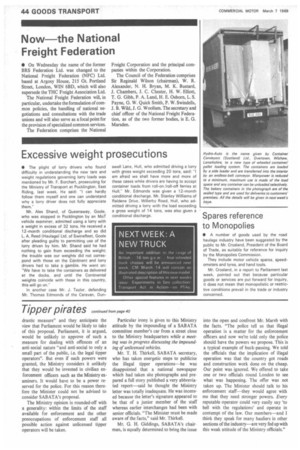Tipp er pirates continued from page 40 drastic measure" and they
Page 46

If you've noticed an error in this article please click here to report it so we can fix it.
anticipate the view that Parliament would be likely to take of this proposal. Parliament, it is argued, would be unlikely to approve of such a measure for dealing with offences of an anti-social nature "and anti-social to only a small part of the public, i.e. the legal tipper operators". But even if such powers were granted, the Ministry considers it unlikely that they would be invested in civilian enforcement officers such as the Ministry examiners. It would have to be a power reserved for the police. For this reason therefore the Minister could not be advised to consider SABATA's proposal.
The Ministry opinion is rounded-off with a generality: within the limits of the staff available for enforcement and the other preoccupations of enforcement staff all possible action against unlicensed tipper operators will be taken. Particular irony is given to this Ministry attitude by the impounding of a SABATA committee member's car from a street close to the Ministry headquarters while a meeting was in progress discussing the impounding of unlicensed vehicles.
Mr. T. H. Thirkell, SABATA secretary, who has taken energetic steps to publicise the illegal tipper operations—he was disappointed that a national newspaper which had taken site photographs and prepared a full story published a very abbreviated report—said he thought the Ministry letter was totally inadequate. He was incensed because the letter's signature appeared to be that of a junior member of the staff whereas earlier interchanges had been with senior officials. "The Minister must be made aware of the facts," said Mr. Thirkell.
Mr. G. H. Giddings, SABATA's chairman, is equally determined to bring the issue
into the open and confront Mr. Marsh with the facts. "The police tell us that illegal operation is a matter for the enforcement officers and now we're told only the police should have the powers we propose. This is a typical example of buck-passing. We told the officials that the implication of illegal operation was that the country got roads and construction work done on the cheap. Our point was ignored. We offered to take one or two officials round London to see what was happening. The offer was not taken up. The Minister should talk to his enforcement staff—they would agree with me that they need stronger powers. Every reputable operator could very easily say 'to hell with the regulations' and operate in contempt of the law. Our members and I think they speak for many hauliers in other sections of the industry—are very fed up with this weak attitude of the Ministry officials."












































































































































































